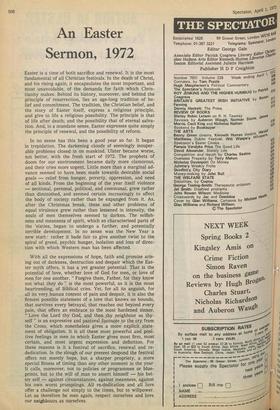An Easter Sermon, 1972
Easter is a time of both sacrifice and renewal. It is the most fundamental of all Christian festivals. In the death of Christ, and his rising again, it encapsulates the most important, and most unavoidable, of the demands for faith which Christianity makes. Behind its history, moreover, and behind the principle of resurrection, lies an age-long tradition of belief and commitment. The tradition, the Christian belief, and the story of Easter itself, express a religious principle, and give to life a religious possibility. The principle is that of life after death; and the possibility that of eternal salvation. And, in a mundane sense, Easter expresses quite simply the principle of renewal, and the possibility of reform.
In no sense has this been a good year so far. It began in trepidation. The darkening clouds of seemingly insuperable problems closed in on mankind. Ulster became worse, not better, with the fresh start of 1972. The prophets of doom for our environment became daily more clamorous, and their cries more urgent. Little more than a marginal advance seemed to have been made towards desirable social goals — relief from hunger, poverty, oppression, and need of all kinds. From the beginning of the year itself violence — sectional, personal, political, and communal, grew rather than diminished, and seemed certain increasingly to affect the body of society rather than be expunged from it. As, after the Christmas break, these and other problems of equal virulence grew rather than lessened in intensity, the souls of men themselves seemed to darken. The selfishness and meanness of spirit, which so characterised parts of the 'sixties, began to undergo a further, and potentially terrible development. In no sense was the New Year a new start : rather it bade fair to give another twist to the spiral of greed, psychic hunger, isolation and loss of direction with which Western man has been affected.
With all the expressions of hope, faith and promise arising out of darkness, destruction and despair which the Easter myth offers, it has a yet greater potential. That is the potential of love, whether love of God for men, or love of men for one another. "Forgive them, Father, for they know not what they do " is the most powerful, as it is the most heartrending, of Biblical cries. Yet, for all its anguish, for all its very human content of pain and despair, it is also the firmest possible statement of a love that knows no bounds, that survives every betrayal, that reaches out beyond every pain, that offers an embrace to the most hardened sinner. "Love the Lord thy God, and then thy neighbour as thyself " is an expressive and pastoral footnote to the cry from the Cross, which nonetheless gives a more explicit statement of obligation. It is all these most powerful and positive feelings in men to which Easter gives most firm, most certain, and most urgent expression and definition. For these reasons is it a festival of sacrifice, renewal and rededication. In the slough of our present despond the festival offers not merely hope, but a sharper propriety, a more special fitness of timing than any other moment in the year It calls, moreover, not to policies or programmes or blueprints, but to the will of man to assert himself — his better self — against circumstances, against meanness, against his own worst promptings. All re-dedication and all love offer a challenge not simply to the times, but to willpower. Let us therefore be men again, respect ourselves and love our neighbours as ourselves.


































 Previous page
Previous page